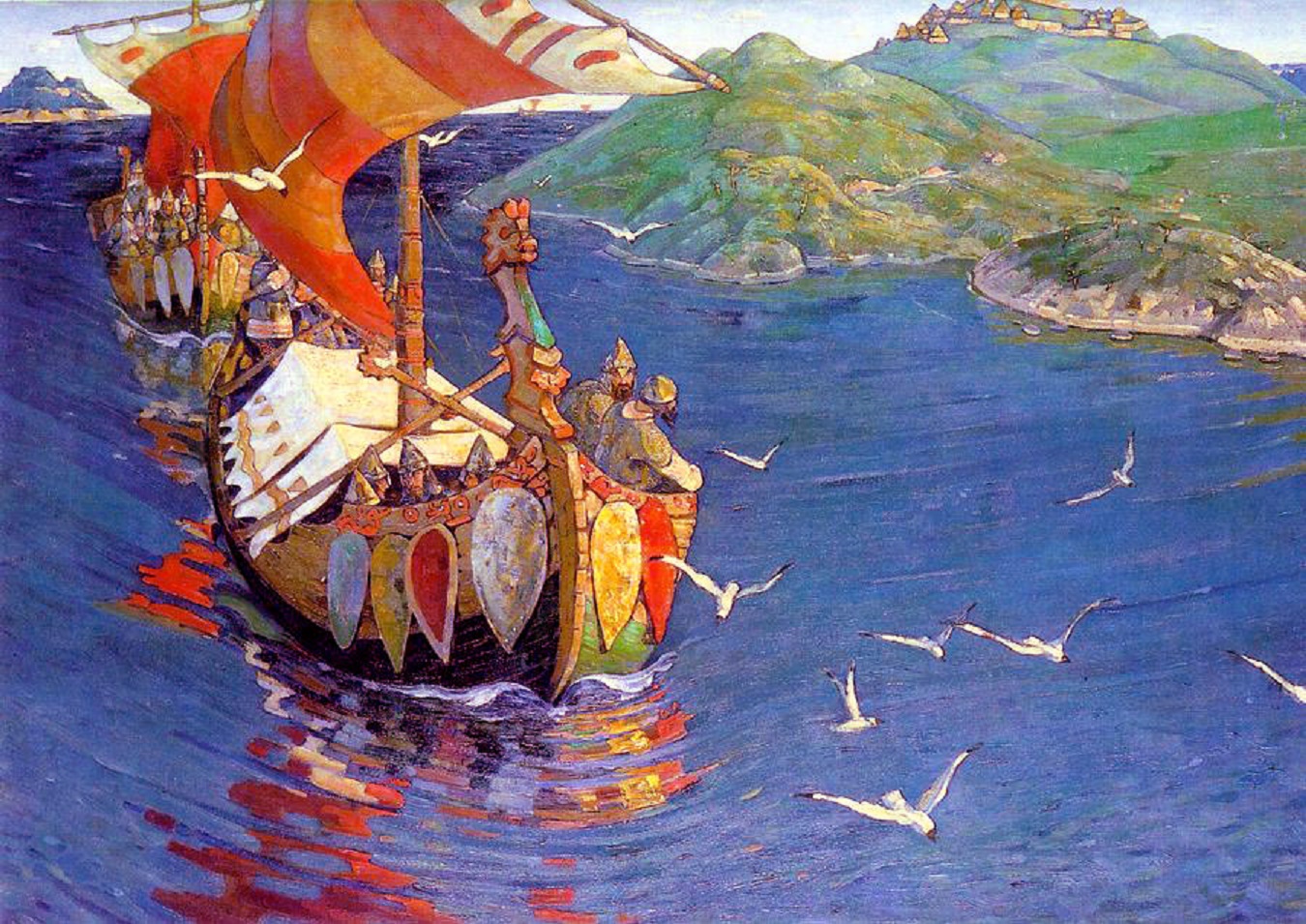Guests from Overseas (1901) by Nicholas Roerich, depicting a Varangian raid.
The Drengr Code was a set of principles that guided the behavior of Viking warriors. It emphasized bravery, loyalty, and honor, both in battle and in everyday life. The code was deeply rooted in the Norse belief system and societal structure, where personal reputation and honor were paramount.
Key Principles
1. Bravery in Battle: A drengr was expected to show courage and fearlessness in the face of danger. This was not just about physical bravery but also about mental fortitude and the willingness to face challenges head-on.
2. Loyalty: Loyalty to one’s family, friends, and community was a cornerstone of the Drengr Code. This loyalty extended to one’s leader or king, and betrayal was considered one of the gravest offenses.
3. Honor and Fair Play: The concept of honor was central to the Drengr Code. A drengr was expected to act with integrity and fairness, even towards enemies. This sense of fair play was crucial in maintaining one’s reputation and standing within the community. Upholding these values ensured that a drengr was respected and trusted by others, reinforcing the importance of honor in Viking society
4. Resilience and Responsibility: Both male and female drengrs were expected to be resilient and take responsibility for their actions. Women who adhered to the Drengr Code had the same rights and responsibilities as men, including owning property and conducting business.
While the core principles of bravery, loyalty, and honor were universally respected, the specific interpretations and applications of these values could vary between clans.
Variations Among Clans
Viking clans from different regions, such as Norway, Denmark, and Sweden, had their own unique customs and traditions. These regional differences influenced how the Drengr Code was practiced and interpreted.
The values and priorities of clan leaders also played a significant role in shaping the code. A leader who valued martial prowess might emphasize bravery in battle, while another who prioritized community welfare might focus more on loyalty and fairness.
As Vikings traveled and settled in various parts of Europe, they encountered different cultures and societies. These interactions sometimes led to the incorporation of new values and practices into the Drengr Code, resulting in variations among clans.
Despite these variations, the fundamental principles of the Drengr Code remained consistent. The emphasis on courage, loyalty, and honor was a unifying factor that defined what it meant to be a drengr across all Viking clans.
Historical Context
The Drengr Code was more than just a set of rules; it was a way of life that influenced Viking society deeply. The Icelandic historian Snorri Sturluson, in his 13th-century work Younger Edda, highlighted the importance of drengskapr (the quality of being a drengr) for the Viking brotherhood. This quality was essential for trust and cooperation in dangerous situations.
Various symbols were associated with the Drengr Code, reflecting its values. For example, the Tiwaz rune, named after the Norse god Tyr, symbolized honor, righteousness, and strength. The Tiwaz rune was an ideographic symbol for a spear. It was a popular symbol among Vikings and represented the qualities of a true drengr.
Preservation of Values
Poets and skalds were vital in preserving and promoting the values of the Drengr Code. Their work ensured that the principles of bravery, loyalty, and honor remained central to Viking culture and were passed down through the ages.Skalds were masterful poets who composed and recited skaldic poetry, a complex form of verse rich in metaphor and intricate meter. This oral tradition was essential for preserving Norse history, cultural identity, and the values of the Drengr Code in an era predating widespread literacy.
Skalds often served at the courts of Scandinavian leaders, where they composed poems that celebrated the heroic deeds of kings and warriors. By glorifying acts of bravery, loyalty, and honor, they reinforced the importance of these values within Viking society.
Through their poetry, skalds recorded and praised historical events, genealogies, and mythological tales. This helped to immortalize the values and stories of their people, ensuring that they were passed down through generations.
Skalds were instrumental in enhancing the prestige of their patrons. By crafting verses that highlighted the virtues and accomplishments of their leaders, they helped to solidify the leaders’ reputations and reinforce the societal importance of the Drengr Code.
Skalds were not only poets but also entertainers. Their performances were a source of both entertainment and education, making the values of the Drengr Code accessible and memorable to the wider community.
Applications for Modern Warriors
The Drengr Code, with its emphasis on bravery, loyalty, honor, and resilience, holds valuable lessons for the modern warrior. In today’s context, these principles can be applied to various aspects of life, from personal development to professional conduct. Bravery encourages individuals to face challenges head-on and take calculated risks, while loyalty fosters strong, trustworthy relationships within teams and communities. Honor and integrity guide ethical decision-making and fair treatment of others, ensuring that one’s actions are aligned with moral values. Resilience, the ability to recover from setbacks and adapt to changing circumstances, is crucial for maintaining mental and emotional strength. By embracing the Drengr Code, modern warriors can cultivate a sense of purpose and commitment, leading to a more fulfilling and impactful life.
Final Thoughts
The Drengr Code encapsulated the ideals of bravery, loyalty, honor, and resilience that were integral to Viking culture. It was a guiding framework that shaped the behavior and values of Viking warriors, ensuring their actions were aligned with the highest standards of their society. It is equally applicable in today’s world.
*The views and opinions expressed on this website are solely those of the original authors and contributors. These views and opinions do not necessarily represent those of Spotter Up Magazine, the administrative staff, and/or any/all contributors to this site.
